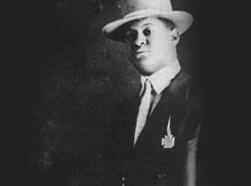


Freddie Keppard
Source: Yester Century Pop
Born on 27 February of 1890 in New Orleans, Freddie Keppard was a cornet player who knew Buddy Bolden, the generally acknowledged father of jazz when it was called jass and of whom no recordings exist. Thirteen years Bolden's junior, Keppard is said to have performed much in Bolden's style. Keppard first played accordion, violin and mandolin. It was the mandolin he played when at about the age of ten he began performing duos with his older brother, Louis. He didn't take up the cornet until he was sixteen, about the same year he formed his first band, the Olympia Orchestra. He then took Bolden's vacated spot not only in the Eagle Band but in general, as his playing was similar. He inherited Bolden's place in New Orleans jazz when the latter was permanently hospitalized with schizophrenia in 1907.
About the cusp of 1911-12 Keppard toured the States with the Original Creole Ragtime Band, which became the Original Creole Orchestra in 1913. He was offered his first recording deal in 1915 by the Victor Talking Machine Company in NYC. But Keppard turned it down, considering the $25 payment (standard for musicians not well known) insufficient. These would have been the first jazz recordings preceding the Original Dixieland Jazz Band by a couple of years. He may also have had an inordinate fear of being copied. Keppard was known to hide his fingering beneath a handkerchief to protect it from thieves, or so he explained what might also have been some amusing jive.
About 1917 Keppard settled in Chicago where, upon the dissolution of his orchestra in 1918, he pursued a solo career. His first recording session arrived in 1918 with Bill Johnson's Creole Jass Band, an unissued test of 'Tack 'Em Down'. In 1923 Keppard contributed cornet to a couple tracks with Erskine Tate's Vendome Orchestra: 'Cutie Blues' and 'Chinaman Blues'.
'Cutie Blues' Erskine Tate’s Vendome Orchestra
Recorded 23 June 1923 in Chicago OKeh 4907 Keppard's first recording to issue
Cornet: Keppard / James Tate Trombone: Fayette Williams
Clarinet: Angelo (Alvin?) Fernandez / Buster Bailey Alto sax: Buster Bailey
Tenor sax: Norval Morton Piano: Adrian Robinson
Banjo: Erskine Tate Jimmy Bertrand: Jimmy Bertrand
Composition: Erskine Tate
Keppard began recording with Doc Cook in 1924. Lord has him performing on 'Old Man Blues' in pianist, Jimmy Blythe's, Birmingham Bluetette, in 1926, but this is contested by Brian Rust. In September 1926 Keppard put down his only tracks as a leader, those with his Jazz Cardinals ('Stock Yards Strut', 'Messin' Around' and two takes of 'Salty Dog').
'High Fever' Cookie's Gingersnaps from the Charles Doc Cook Dreamland Orchestra
Recorded 22 June 1926 in Chicago Matrix 9769-A OKeh 8369
Cornet: Keppard Trombone: Fred Garland
Clarinet: Jimmie Noone Alto / tenor sax: Joe Poston
Piano: Kenneth Anderson Banjo: Johnny St. Cyr
Composition: Joe Sanders
'Here Comes the Hot Tamale Man'
Cookie's Gingersnaps from the Charles Doc Cook Dreamland Orchestra
Recorded 22 June 1926 in Chicago Matrix 9770-A OKeh 8369
Cornet: Keppard Trombone: Fred Garland
Clarinet: Jimmie Noone Alto / tenor sax: Joe Poston
Piano: Kenneth Anderson Banjo: Johnny St. Cyr
Composition: Charles Harrison / Fred Rose
'Stock Yards Strut' Freddie Keppard's Jazz Cardinals
Recorded Sep 1926 in Chicago Matrix 2651-1 Paramount 12399
Cornet: Keppard Trombone: Eddie Vincent
Clarinet: Johnny Dodds Piano: Arthur Campbell Woodblocks: Jasper Taylor
Composition: Jasper Taylor
'Salty Dog' Freddie Keppard's Jazz Cardinals
Recorded Sep 1926 in Chicago Matrices 2653-1 & 2653-2 both issued on Paramount 12399
Cornet: Keppard Trombone: Eddie Vincent
Clarinet: Johnny Dodds Piano: Arthur Campbell
Woodblocks: Jasper Taylor Vocal: Papa Charlie Jackson
Composition: Papa Charlie Jackson
Keppard is found on a couple of tracks by Jasper Taylor and his State Street Boys in 1927 ('Stomp Time Blues' and 'It Must Be the Blues'). Come Frankie Half Pint Jaxon in 1928 which session was his last as traced by Lord.
'Hit Ta Ditty Low Down' Frankie Half Pint Jaxon
Recorded 28 Oct 1928 in Chicago Matrix C-2500 Vocalion 1226
See also Document DOCD-5258
Cornet: Keppard Piano: Prob Thomas A. Dorsey
Prob Keppard's next to last recording
Composition: Jaxon
'Down At Jasper's Bar-B-Que' Frankie Half Pint Jaxon
Recorded 28 Oct 1928 in Chicago Matrix C-2502 Vocalion 1226
See also Document DOCD-5258
Cornet: Keppard Piano: Prob Thomas A. Dorsey
Prob Keppard's last recording
Composition: Jaxon
Keppard was gradually taken down by alcoholism and tuberculosis, no longer able to perform by latter 1932. He died of tuberculosis in Chicago on 15 July 1933.
Sources & References for Freddie Keppard:
VF History (notes)
Recordings: Catalogs:
45 Cat All Music Discogs Music Brainz RYM
Recordings: Sessions:
Scott Alexander (Keppard's Jazz Cardinals 1926)
Tom Lord: leading 1 of 9 sessions 1923-28
Authority Search: VIAF World Cat
Other Profiles: Black Past Blues Trail Piero Scaruffi
Classical Main Menu Modern Recording
|
|
hmrproject (at) aol (dot) com